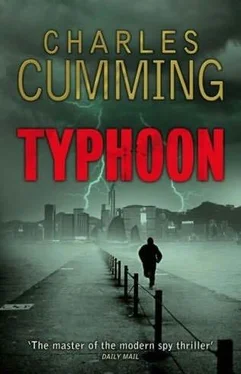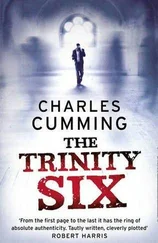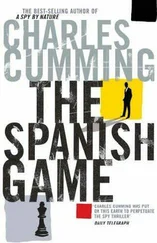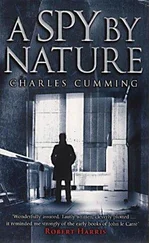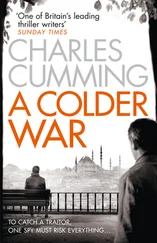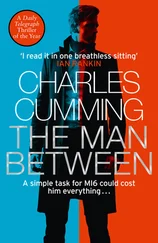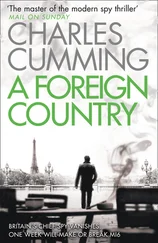Charles Cumming - Typhoon
Здесь есть возможность читать онлайн «Charles Cumming - Typhoon» — ознакомительный отрывок электронной книги совершенно бесплатно, а после прочтения отрывка купить полную версию. В некоторых случаях можно слушать аудио, скачать через торрент в формате fb2 и присутствует краткое содержание. Жанр: Шпионский детектив, на английском языке. Описание произведения, (предисловие) а так же отзывы посетителей доступны на портале библиотеки ЛибКат.
- Название:Typhoon
- Автор:
- Жанр:
- Год:неизвестен
- ISBN:нет данных
- Рейтинг книги:5 / 5. Голосов: 1
-
Избранное:Добавить в избранное
- Отзывы:
-
Ваша оценка:
- 100
- 1
- 2
- 3
- 4
- 5
Typhoon: краткое содержание, описание и аннотация
Предлагаем к чтению аннотацию, описание, краткое содержание или предисловие (зависит от того, что написал сам автор книги «Typhoon»). Если вы не нашли необходимую информацию о книге — напишите в комментариях, мы постараемся отыскать её.
Typhoon — читать онлайн ознакомительный отрывок
Ниже представлен текст книги, разбитый по страницам. Система сохранения места последней прочитанной страницы, позволяет с удобством читать онлайн бесплатно книгу «Typhoon», без необходимости каждый раз заново искать на чём Вы остановились. Поставьте закладку, и сможете в любой момент перейти на страницу, на которой закончили чтение.
Интервал:
Закладка:
“As I have told you and your colleagues many times, I am holding information for the British government which will be of vital importance to the relationship between our two countries. That is why I have to see Governor Patten immediately.”
Joe smiled. He knew now that he was being lied to, in the way that you know when a person is bored by your company. “And where do you want to meet him?” he asked. “Surely not in Government House? Aren’t the Chinese disdainful of our feng shui?”
This was intended as a joke, but Wang did not find it funny. Speaking in Mandarin for the first time, he said, “Do not make fun of me, young man.”
“Then tell me the truth.” Joe wasn’t about to be patronized and snapped back his response. He was struck by the sudden fierceness in Wang’s gaze, not because it unsettled him, but because for the first time he could see the force of the professor’s will.
“I am telling you the truth.”
“Well, then I’m sorry to have to inform you that a meeting of that kind is highly unlikely. I am as close to Governor Patten as you are likely to get. And unless I leave here tonight with some firm answers, the Black Watch are under instructions to return you to China without delay. Your presence here contravenes political understandings between our two countries.”
Wang breathed very deeply so that his chin lifted to the ceiling. Joe’s sudden shift in mood had forced his hand and he was now at the edge of his luck. He would have to confide in this Mr. John Richards, whoever he was, and run the risk that his revelation would simply be ignored by an indifferent British spy.
“Why don’t…”
Both men had started speaking at the same time. Joe said, “Go ahead.”
“You first, please.”
“Fine.” Joe wanted to light a cigarette but decided against it. The air in the tiny room was already stale and unpleasant enough. “When you were first interrogated by Lance Corporal Anderson, you mentioned an apartment here in Kowloon.” He thought back to Barber’s report and recalled the address from memory. “Number 19, 71 Hoi Wang Road. What was the significance of that?”
“There was no significance. I made it up.”
“Just like that?”
Wang did not understand the idiom and asked for a translation in Mandarin. Joe provided it and the conversation briefly continued in Chinese.
“So Hoi Wang Road is not the address of someone you know here in Hong Kong? It’s not an apartment at which you have stayed on any previous visit to the colony?”
“I have never been to Hong Kong before.”
Joe made a mental note to have the address investigated before reverting to English. “And why now?” he said. “Why do you have to see Governor Patten in person?”
Wang stood up. When he turned towards the window and leaned against the curtains, Joe had a sudden mental image of the popular professor organizing his notes in a packed Urumqi lecture hall, preparing to address a room full of eager students. “Because he is the only man in any Western government who has demonstrated an interest in the preservation of our basic human rights. Because he is the only man who might have the power to do something about this.”
“About what? We’re talking about human rights now? I thought you wanted to talk about a defection?”
Wang turned round and stepped closer to Joe. He looked angry, as if finally exasperated by a long day of pressure and lies. “Mr. Richards, you are clearly an intelligent man. You know as well as I do that I know nothing about any plans for any member of the Chinese state apparatus to defect. You know as well as I do that this was a story I invented to assist my journey to Hong Kong.”
“So what do you know?” Joe wasn’t surprised by the sudden confession. It had been coming for some time. “What is this pressing story you want to share with us? What makes you think that the British government is in any sort of position to grant political asylum to a man like you? What makes Professor Wang Kaixuan so special?”
And Wang fixed him hard in the eyes and said, “I will tell you.”
8
“My father’s name was Wang Jin Song.” On the surveillance recording you can hear an eerie silence in that cramped, air-starved safe house, as if all of Hong Kong were suddenly listening in. “He was born in Shanghai and worked as a schoolteacher in the Luwan district, close to People’s Square. He married my mother, Liu Dong Mei, in 1948. She was the daughter of a Kuomintang soldier killed during the Japanese invasion. I was born in 1949, Mr. Richards, so at least I share a birthday with the People’s Republic of China, if nothing else. When I was five years old, my parents were obliged to relocate to Xinjiang province as part of Mao’s policy of mass Han immigration. Perhaps you have heard of this? Perhaps it was mentioned in one of your lectures at Oxford? Sinicization, I think they call it in English. I apologize if I am not correct in my pronunciation. Based on a Soviet model, the Stalinist idea of diluting a native people with the dominant imperial race, so that this native population is gradually destroyed. My parents were two of perhaps half a million Han who settled in Xinjiang during this period. My father was given a job as a schoolteacher in Kashgar and we lived in a house that had been owned by a Uighur landowner whom my father believed had been executed by the communists. This was part of Mao’s gradual purging of the Muslim elite, the execution of imams and noblemen, the confiscation of Uighur properties and the seizure of lands. All of this is a matter of historical record.”
“Let a hundred flowers bloom,” Joe said, trying to sound clever, but Wang produced a look of reproach which corrected him.
“That came later.” There was an edge of disappointment in the professor’s voice, as if a favourite student had let him down. “Of course, when my family had been living in Kashgar for two or three years, they became aware of the policy that we now know as the hundred flowers bloom. The Party’s seemingly admirable desire to listen to the opinions of its people, of Party members, in this case the Uighur population. But Mao did not like what he heard. He did not like it, for example, that Turkic Muslims resented the presence of millions of Han in their country. He did not like it that Uighurs complained that they were given only nominal positions of power, while their Han deputies were the ones who were trusted and rewarded by Beijing. In short, the people demanded independence from communist China. They demanded the creation of an Eastern Turkestan.”
“So what happened?”
“What happened is what always happens in China when the people confront the government. What happened was a purge.” Wang helped himself to another glass of water. Joe had the feeling that the story had been told many times before, and that it was perhaps best to avoid any further interruptions. “A Party conference was called in Urumqi, but rather than listen to their complaints, the provincial government took the opportunity to arrest hundreds of Uighur officials. Fifty were executed. Without trial, of course. Trials do not exist in my country. This is what became of the flowers that bloomed, this is what became of Mao’s promise to create an independent Uighur republic. Instead, Xinjiang became an ‘autonomous region,’ which it remains to this day, much as Tibet is ‘autonomous,’ and I surely do not need to educate you about that.”
“We are aware of the parallels with Tibet,” Joe said, a statement as empty, as devoid of meaning, as any he had uttered all night. What did he mean by “we?” In three years as an SIS officer he had heard Xinjiang mentioned-what? — two or three times at official level, and then only in connection to oil supplies or gas fields. Xinjiang was just too far away. Xinjiang was somebody else’s problem. Xinjiang was one of those places, like Somalia or Rwanda, where it was better that you just didn’t get involved.
Читать дальшеИнтервал:
Закладка:
Похожие книги на «Typhoon»
Представляем Вашему вниманию похожие книги на «Typhoon» списком для выбора. Мы отобрали схожую по названию и смыслу литературу в надежде предоставить читателям больше вариантов отыскать новые, интересные, ещё непрочитанные произведения.
Обсуждение, отзывы о книге «Typhoon» и просто собственные мнения читателей. Оставьте ваши комментарии, напишите, что Вы думаете о произведении, его смысле или главных героях. Укажите что конкретно понравилось, а что нет, и почему Вы так считаете.
